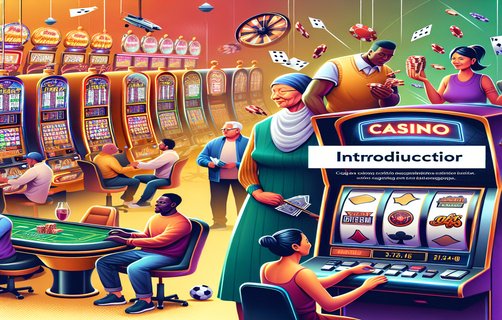Mastering the Art of Poker: Strategy Beyond the Flop
पोकर की कला: फ्लॉप के परे रणनीति

In the intricate ballet of poker, players often find themselves caught between the rigid structures of mathematical odds and the fluid currents of human emotion. The game is an ongoing duel, where strategic thinking and psychological fortitude collide in the pursuit of victory. One of the most challenging aspects of post-flop strategy is balancing one’s approach based on an array of dynamic factors. Players must navigate the fine line between aggression and caution, assessing not just the strength of their own hand but also how their opponents might react based on the board texture and previous actions.
Turn drawouts can drastically alter the flow of a game. Facing a turn that completes a possible draw or enhances the opponent's hand can create a sense of urgency to either protect one’s stack or capitalize on an opportunity. It's vital for players to recalibrate their strategies to include these new drawouts, weighing the potential risks against the expected value of their bets. An integral aspect of this involves accurately calculating the folding equity in each situation. Miscalculating this can lead to significant losses, as a player may push too hard against a tough opponent or fold at a moment that could have been lucrative.
Adjusting position flow—how players shift their strategy depending on their position at the table—is another essential element in the post-flop strategy. Early positions require a tighter hand selection, while late positions allow for a broader range of speculative hands due to expanded opportunities for information gathering. This fluidity can lead to devastating outcomes if not properly accounted for, as opponents may exploit positional weaknesses if a player is not sufficiently adaptable.
Hand odds fluctuating in real-time can instigate emotional responses, which are the silent enemies of every poker player. The key is to maintain emotional calm, especially when the stakes are high. Human psychology plays a massive role in how players navigate their decisions, oftentimes leading to impulsive actions or stubbornness to stay in a hand longer than is warranted. Practicing emotional regulation can not only enhance decision-making but also allow a player to exploit the emotional tells of their opponents, further tipping the scales in their favor.
In summary, mastering poker involves dancing with both strategy and emotion. The balance in post-flop strategy, acutely aware of turn drawouts, accurate folding equity calculation, strategic adjustments based on position, real-time hand odds fluctuations, and subconscious emotional responses are all essential threads in the rich tapestry of successful poker play. Each decision should be a calculated step upon the tightrope of risk and reward, carrying players forward in their quest for victory at the table.
पोकर की जटिल बालेट में, खिलाड़ी अक्सर गणितीय संभावनाओं के कठोर ढांचे और मानव भावनाओं के तरल प्रवाह के बीच फंस जाते हैं। यह खेल एक निरंतर द्वंद्व है, जहां रणनीतिक सोच और मनोवैज्ञानिक दृढ़ता विजय की खोज में टकराती हैं। पोस्ट-फ्लॉप रणनीति के सबसे चुनौतीपूर्ण पहलुओं में से एक अपने दृष्टिकोण को गतिशील कारकों की श्रृंखला के आधार पर संतुलित करना है। खिलाड़ियों को आक्रामकता और सावधानी के बीच संतुलन बनाए रखना होगा, न केवल अपनी हाथ की ताकत का आकलन करते हुए बल्कि यह भी कि उनकी प्रतिकृतियाँ बोर्ड टेक्सचर और पिछले कार्यों के आधार पर कैसे हो सकती हैं।

टर्न ड्रॉआउट खेल के प्रवाह को नाटकीय रूप से बदल सकते हैं। एक टर्न का सामना करना जो एक संभावित ड्रॉ को पूरा करता है या प्रतिकारी के हाथ को बढ़ाता है, stack की सुरक्षा या अवसर का लाभ उठाने की भावना पैदा कर सकता है। खिलाड़ियों के लिए नई ड्रॉआउट्स को शामिल करते हुए अपनी रणनीतियों को फिर से कैलिब्रेट करना आवश्यक है, संभावित जोखिमों को उनके दांव के अपेक्षित मूल्य के खिलाफ तौलना। इसका एक अभिन्न पहलू प्रत्येक स्थिति में फोल्डिंग इक्विटी की सटीकता से गणना करना है। इसे गलत समझने से महत्वपूर्ण नुकसान हो सकते हैं, क्योंकि खिलाड़ी किसी कठिन प्रतिकारी के खिलाफ बहुत अधिक धक्का दे सकते हैं या उस क्षण में फोल्ड कर सकते हैं जो लाभकारी हो सकता था।
स्थिति प्रवाह को समायोजित करना - तालिका में उनकी स्थिति के आधार पर खिलाड़ियों की रणनीति कैसे बदलती है - एक और आवश्यक तत्व है। शुरुआती स्थानों को तंग हाथ चयन की आवश्यकता होती है, जबकि अंतिम स्थानों में विशिष्ट हाथों की एक विस्तृत श्रृंखला की अनुमति होती है क्योंकि जानकारी प्राप्त करने के अवसर बढ़ जाते हैं। अगर ठीक से ध्यान न दिया जाए तो यह तरलता भयंकर परिणाम दे सकती है, क्योंकि प्रतिकारी स्थिति की कमियों का लाभ उठा सकते हैं यदि खिलाड़ी पर्याप्त रूप से अनुकूलनशील नहीं है।
वास्तविक समय में हाथ की संभावनाएं उतार-चढ़ाव कर सकती हैं, जिससे भावनात्मक प्रतिक्रिया उत्पन्न होती है, जो हर पोकर खिलाड़ी का गुप्त दुश्मन होती है। कुंजी यह है कि भावनात्मक ठंड बनाए रखने की कोशिश करें, विशेष रूप से जब दांव ऊँचे हों। मानव मनोविज्ञान उन तरीकों में महत्वपूर्ण भूमिका निभाता है जिनसे खिलाड़ी अपने निर्णयों को नेविगेट करते हैं, अक्सर न तो आवेगपूर्ण कार्रवाई करने की ओर और न ही किसी हाथ में रहने के लिए जिद्दी बने रहते हैं जितना कि अनिवार्य है। भावनात्मक नियमन का अभ्यास न केवल निर्णय लेने को बढ़ा सकता है बल्कि खिलाड़ियों को प्रतिकारी के भावनात्मक टेल्स का लाभ उठाने की अनुमति भी दे सकता है, जो उनके पक्ष में अधिक तराजू को झुका देगा।
संक्षेप में, पोकर में महारत हासिल करना रणनीति और भावना के साथ नृत्य करना शामिल है। पोस्ट-फ्लॉप रणनीति में संतुलन, टर्न ड्रॉआउट्स, सटीक फोल्डिंग इक्विटी की गणना, स्थिति के आधार पर रणनीतिक समायोजन, वास्तविक समय में हाथ की संभावनाओं के उतार-चढ़ाव, और अवचेतन भावनात्मक प्रतिक्रियाएं सफल पोकर खेल में सभी महत्वपूर्ण धागे हैं। प्रत्येक निर्णय जोखिम और पुरस्कार की तंग रस्सी पर एक गणनात्मक कदम होना चाहिए, जो खिलाड़ियों को उनकी विजय की खोज में आगे ले जा रहा है।

comments
PokerFan99
This article really captures the essence of post-flop strategy! Totally agree on the emotional aspect.
GambitMaster
Understanding folding equity is crucial. I’ve lost too many pots because I misjudged it.
AceHigh
The part about adjusting position flow hit home. It’s often overlooked but so important!
BluffKing22
Great insights! Balancing aggression and caution is something I struggle with.
ChipStacker
I love how you discussed drawouts. They can really change the game in a heartbeat.
TiltedPlayer
Keeping emotions in check is harder than it seems. Thanks for the reminder!